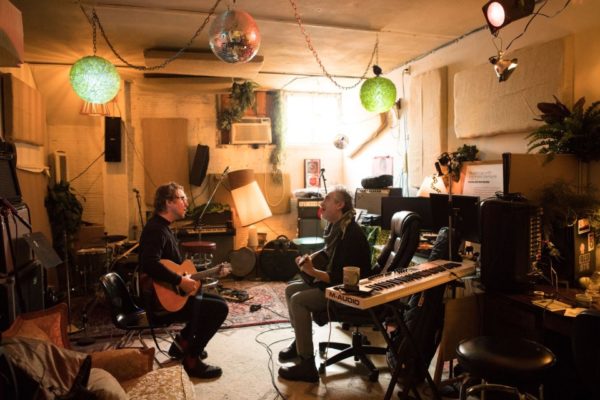Erik Sanden and Joe Reyes have been making music together for nearly 20 years – in the arty, irreverent pop-rock band Buttercup, since 2002, and as the sparse, ethereal acoustic pop duo Demitasse, since 2010.
In that time, over the course of seven Buttercup albums and EPs, two Demitasse albums, and countless live performances, the pair have developed a creative and personal kinship as magnetic as it is productive.
The two, together and separately, also have been staunch supporters of the local music scene, frequently giving advice, lending their talents, and offering encouragement to younger musicians.
For their generosity of spirit and for their music, the pair has become a beloved fixture for those who participate in or closely follow local music.
On Saturday night at the Tobin Center for the Performing Arts, Sanden and Reyes will celebrate the release of the third Demitasse album, Perfect Life, with a show that marks the first time Demitasse and Buttercup will share a stage. The album, which will come out on vinyl and streaming platforms Feb. 7, was recorded in just two weeks, back in April, with production and light overdubbing taking another two weeks on and off.
The brevity of the process was the result of a deliberate decision not to overthink, overwork, or overproduce.
While conventional wisdom might suggest that musicians and songwriters reach new heights of complexity as their careers progress, Sanden’s and Reyes’ journey has led them to prize simplicity and to pursue improvisational magic with “respect for the moment,” according to Reyes.
Sanden and Reyes were musicians long before the formation of Buttercup, with Sanden, 48, coming up in indie and punk circles and Reyes, 56, working in a variety of genres as a sought-after guitarist and producer with a Grammy, among other accolades, under his belt.
“I used to make records where I would just polish everything and try to make it perfect,” Reyes said, “but you can never really get it perfect, and even if you did no one would notice or care.
“I realized in working with Erik and Odie” – the other core Buttercup member – “that songwriting and music-making isn’t about that at all. It’s about feeling and emotion and being in the moment.”
Among Perfect Life’s 10 tracks, some are somber and gossamer – “very fragile, barely alive,” as Sanden put it – and some skew toward uptempo, even managing spryness on occasion.
For Reyes, the lessons in letting go, in chasing something more immediate and precious than perfection or technical polish, began at the onset of his collaboration with Sanden. They both fondly recall a game of “aesthetic pool” that they played in 2002 as a formative occurrence, a kind of unofficial initiation for Reyes.
“The important thing wasn’t to make the shot,” Sanden recalled, “but to do something unexpected” or especially stylish or outlandish in attempting the shot.
Reyes remembers being amused and a bit bewildered as Sanden draped himself across the pool table and flicked a ball or knelt down and attempted to blow a ball into a pocket.
Succumbing to Sanden’s charismatic zaniness, a trait that has long hallmarked Buttercup’s music and stage show, Reyes picked up the cue ball and, with a mischievous twinkle in his eye, launched it across the room and into a trash can, where it shattered bottles and generally made a ruckus.
“I was like, ‘All right, he’s in,’” Sanden recalled.
While it might seem too convenient to call this pool game a metaphor for the pair’s entire partnership, it’s hard to deny the parallels. Reyes has learned to forget the rules and strictures of making music in favor of chasing the joyful spirit of creativity itself.
According to Sanden and Reyes, the sessions for Perfect Life followed an organic pattern: One of them would bring in a song idea and they would immediately start recording, often capturing what is heard on the album in the first or second take.
Usually, a band will take time to iron out the details of a song in practice sessions before even trying to record it. And, following that, there often are many takes in the recording process, as band members try to tweak the song to match some ideal version of it that exists in their minds.
The way Sanden and Reyes have come to see it, however, this process often drains a song of its magic.
When a song is new and unpracticed, both musicians said they feel a certain excitement and nervousness, the buzz of creative impulse not yet flattened out by process. They said the idea with recording Perfect Life, more than anything else the two have done in either of their bands, was to try to capture that excitement, that buzz, on the album.
“When we are making stuff up in real time,” Reyes said, “we really have to be present and aware. We’re watching each other’s hands and faces.”
Both report enjoying the freneticism and the creative pressure to work quickly and in a way that will honor the song and their talents. And both expressed satisfaction with the resulting album.
“We figure if these little moments when we are playing off of each other, and trying to get at the magic, can make us say ‘whoa,’ then maybe the listener will have that reaction, too,” Reyes said.





